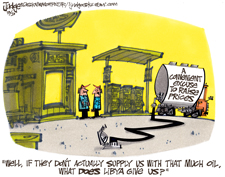Financial crisis panel demands documents from Moody's
How Moody's contributed to the economic collapse
- Story | Senate to ask Moody's chief why bad bonds got good ratings
- Story | Now it's the Senate's turn to take on Goldman, Moody's
- Story | Where was Moody's board when top-rated bonds blew up?
- Story | Bill to tighten rules on ratings agencies has big loopholes
- Story | How Moody's sold its ratings - and sold out investors
- On the Web | More McClatchy coverage of the nation's economic pain
By Kevin G. Hall | McClatchy Newspapers
WASHINGTON — Angered by what it viewed as foot dragging, a special panel charged with getting to the bottom of the nation's financial crisis issued a subpoena Wednesday to compel Moody's Corp. to provide information.
It was the first such subpoena issued by the Financial Crisis Inquiry Commission, and comes days before Moody's chief Ray McDaniel is scheduled to appear Friday before the Senate Permanent Subcommittee on Investigations.
In a statement, commission Chairman Phil Angelides and Vice Chairman Bill Thomas accused Moody's of "failing to comply with a request for documents in a timely manner."
Late Wednesday, Angelides held a teleconference with journalists and said his panel had sent a request to Moody's on March 10 for e-mail records and documents and didn't receive any until after the announcement of the subpoena.
Noting that to date, the commission has received more than 2 million pages of documents from others, the chairman, a former California state treasurer, accused Moody's of stalling.
"What we cannot allow to happen is that we let people run out the clock here, we can't let that happen," said Angelides, referring to his mandate to issue a detailed report to Congress in December.
He declined to elaborate on the specific documents he sought. He said there have been two other subpoenas that were procedural as part of voluntary testimony, and that Wednesday's was the first for failing to cooperate.
Moody's didn't respond to a request for comment.
The commission's subpoena follows a Monday news conference by California Attorney General Jerry Brown to announce court action against Moody's to compel the company to comply with a subpoena he issued seven months ago.
Moody's is under pressure on many fronts to explain its role in providing the investment grade ratings to complex financial deals backed by U.S. mortgages that proved to be anything but investment grade. These deals helped deepen the nation's housing crisis, which provoked the broader financial crisis.
As a credit-rating agency, Moody's enjoys free-speech protection, since its business amounts to providing opinions about the creditworthiness of bonds and other securities. However, the company now faces class-action lawsuits, a suit by the state of Connecticut and a probe by the California attorney general because it not only gave opinions but also consulted on the composition of complex deals it rated.
Legislation moving through Congress would impose tougher rules barring such apparent conflicts of interest, but the inquiry commission has until December to report to Congress on the causes of the crisis and wants information now.
The commission already had announced it would hold a special hearing into the credit-rating agencies' practices in the months ahead, and Wednesday issued the subpoena in reaction to Moody's failure to respond to its requests.
Because it's a bipartisan commission, the panel needed to have at least six of its 10 members sign off before issuing a subpoena. In an interview at the start of the commission's work, both Angelides and Thomas, a former California GOP congressman, vowed to McClatchy that they'd use their subpoena powers aggressively.
The subpoena adds intrigue to a much anticipated hearing scheduled for Friday, when the Senate Permanent Subcommittee on Investigations looks into the role that credit-rating agencies played in the financial meltdown.
Moody's CEO McDaniel has said little publicly about his company's role in the crisis, as the dominant player in the rating of complex deals, called structured finance, which often netted rating agencies $1 million or more per deal.
He stands out for keeping his job after a number of Wall Street financial firms have seen their executives step aside or be forced out in the aftermath of the crisis.
One explanation came Wednesday morning, when Moody's reported strong first quarter earnings that reflected a 26 percent increase over the comparable three months of 2009.
However, in a statement accompanying those first-quarter results, McDaniel cautioned against forecasting a strong 2010 "due to uncertainty that (bond) issuance levels later in the year will continue to overcome weakness in some areas of structured finance."
Revenues from structured finance, mostly deals involving shaky U.S. mortgages, powered Moody's stock from under $20 to above $72 from 2002 to 2007. The company's share price fell almost 5 percent to under $26 after the subpoena announcement.
ON THE WEB
MORE FROM MCCLATCHY
Message to Wall St. in Goldman case: SEC 'back on the job'
Now it's the Senate's turn to take on Goldman, Moody's
Where was Moody's board when top rated bonds blew up?
How Moody's sold its ratings — and sold out investors
To ask a question about this story or any economic question, go to McClatchy's economy Q&A
We welcome comments. To post one, you must sign in using either your McClatchyDC login or your login for Facebook, Twitter or Disqus. Just click the appropriate box below.
Please keep your comment civil, short and to the point. Obscene, profane, abusive and off topic comments will be deleted. Repeat offenders will be blocked. If you find a comment abusive or inappropriate, please flag it for the moderator by placing your cursor on the comment, then clicking the "flag" link that appears. Thanks for your participation.



